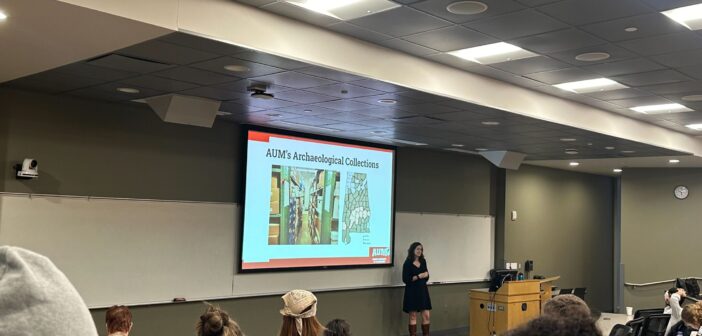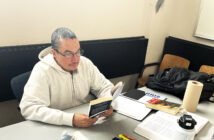In 1990, The Native American Graves and Protection and Repatriation Act was passed federally and required that all Native American remains, funerary and sacred items be protected, treated with dignity and returned to their appropriate ancestors.
Dr. Megan LeBlanc, a guest speaker from Auburn University at Montgomery, discussed the passage of the Native American Graves and Repatriation Act this semester at Lehigh.
Lehigh was loaned components of the David Chase Collection — a collection of items from Alabama indigenous land — in the 1990s, and part of LeBlanc’s visit to Lehigh was to collect the ancestors and cultural items and escort them back to Auburn University Montgomery.
Lehigh is one of about six universities that currently holds the David Chase collection, LeBlanc said.
Armando Anzellini, a professor of anthropology at Lehigh, said when he first found the David Chase collection at Lehigh, he knew these materials and ancestors didn’t belong to the university.
In 2022, Anzellini said he began determining the proper location of these collections After finding paperwork stating that this collection belonged to Auburn University at Montgomery, Anzellini started working on its return with LeBlanc.
She said her interest in anthropology began in high school, but she was fully able to explore it during her time as an undergraduate student at Texas Christian University. After taking her first archaeology class, LeBlanc said she was “completely sold” on pursuing an education in anthropology and archaeology.
LeBlanc then decided to pursue graduate school at the University of Florida to continue her passion for anthropology. She said she became involved with the Florida Museum and discovered an interest in museum collections and NAGPRA work.
By studying NAGPRA, LeBlanc said archeologists have the opportunity to make archeology more ethical and it’s important to have conversations about NAGPRA to inspire younger archeologists to build better relationships with Indigenous communities.
“I realized how important it is for anthropologists and archeologists to reckon with their past and some of the hurtful practices they have done when studying Indigenous individuals,” she said.
LeBlanc currently serves as the NAGPRA coordinator at Auburn University at Montgomery and works to return the remains of ancestors to the appropriate tribe and other sacred items to tribal nations in Alabama. She said her role also entails communication with 13 different federally recognized tribes.
Leblanc said working with legacy collections brings a multitude of challenges as she works with ancestors, specimens and bodies. She said there’s a lack of documentation on the collections, and sometimes, there are no official records, missing reports or items or undocumented transfers.
She said there can also be problems with curation facilities where the collections are stored. Specific issues encountered include the storage of collection in minimally staffed labs or the use of non-archival supplies.
LeBlanc said it’s important to be respectful when working with these tribes to reconnect them with the belongings of their ancestors. Instead of labeling samples as bones, specimens or bodies when analyzing samples, she said she refers to them as ancestors to honor their memory and humanity.
Anzellini said people who work in the scientific field could learn lessons through conversations about NAGPRA and studying LeBlanc’s work.
“Its important for everyone to learn about potential negative impacts of a science that only considers the scientific benefits rather than the impact it might have on people’s lives,” he said.
Students in an introduction to archeology class, including Ella Makin, ‘28, attended the guest speaker event to learn about regulations on the rightful belongings of cultural groups related to their class.
Makin said she was previously unaware of NAGPRA laws.
“It was interesting learning about them and see how they are being handled in universities,” she said.
Although LeBlanc said she doesn’t know exactly what items Lehigh had, but she knows ancestors and funerary items are included in the collection.
After the discussion, LeBlanc began the drive to Alabama to return the remains of the ancestors. She said she was driving the materials because the university’s tribal partners requested that the collection not be flown or mailed to prevent flight and mail damages.






Comment policy
Comments posted to The Brown and White website are reviewed by a moderator before being approved. Incendiary speech or harassing language, including comments targeted at individuals, may be deemed unacceptable and not published. Spam and other soliciting will also be declined.
The Brown and White also reserves the right to not publish entirely anonymous comments.